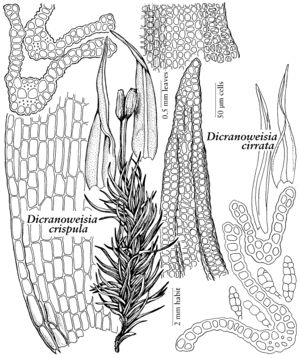Difference between revisions of "Dicranoweisia crispula"
Bryol. Siles., 49. 1869,.
FNA>Volume Importer |
FNA>Volume Importer |
||
| Line 13: | Line 13: | ||
|name=Dicranoweisia crispula var. compacta | |name=Dicranoweisia crispula var. compacta | ||
|authority=(Schwägrichen) Lindberg | |authority=(Schwägrichen) Lindberg | ||
| − | }}{{Treatment/ID/Synonym | + | }} {{Treatment/ID/Synonym |
|name=Dicranoweisia contermina | |name=Dicranoweisia contermina | ||
|authority=Kindberg | |authority=Kindberg | ||
| − | }}{{Treatment/ID/Synonym | + | }} {{Treatment/ID/Synonym |
|name=Dicranoweisia roellii | |name=Dicranoweisia roellii | ||
|authority=Kindberg | |authority=Kindberg | ||
| − | }}{{Treatment/ID/Synonym | + | }} {{Treatment/ID/Synonym |
|name=Trichostomum alpinum | |name=Trichostomum alpinum | ||
|authority=Schwägrichen | |authority=Schwägrichen | ||
| − | }}{{Treatment/ID/Synonym | + | }} {{Treatment/ID/Synonym |
|name=Weissia compacta | |name=Weissia compacta | ||
|authority=unknown | |authority=unknown | ||
| Line 40: | Line 40: | ||
|elevation=10-2000 m | |elevation=10-2000 m | ||
|distribution=Greenland;Alta.;B.C.;Man.;N.B.;Nfld. and Labr. (Nfld.);N.S.;Nunavut;Ont.;Que.;Yukon;Alaska;Ariz.;Calif.;Colo.;Idaho;Maine;Mich.;Mont.;Nev.;N.H.;N.Mex.;N.C.;Oreg.;S.Dak.;Tenn.;Utah;Wash.;Wyo.;Asia. | |distribution=Greenland;Alta.;B.C.;Man.;N.B.;Nfld. and Labr. (Nfld.);N.S.;Nunavut;Ont.;Que.;Yukon;Alaska;Ariz.;Calif.;Colo.;Idaho;Maine;Mich.;Mont.;Nev.;N.H.;N.Mex.;N.C.;Oreg.;S.Dak.;Tenn.;Utah;Wash.;Wyo.;Asia. | ||
| − | |discussion=<p>Dicranoweisia crispula is an extremely variable species. In stature the plants vary 1–6 cm, while the leaf length varies 1–3.5 mm. The capsules vary considerably from cylindric to short-elliptic, with the length ranging 0.5–2 mm. The shape and sheathing of the perichaetial leaves is also variable. Although this species is autoicous, sex organs are often absent, especially in terrestrial plants, with sporophytes correspondingly infrequent. Differentiation of alar cells is often weak in North American material and the striolation can also be weak, and is best observed on cells adjacent to the costa. This species is widespread mainly at higher elevations in western North America, but sporadic in the eastern part of the continent, again occurring mainly at higher elevations.</p> | + | |discussion=<p><i>Dicranoweisia crispula</i> is an extremely variable species. In stature the plants vary 1–6 cm, while the leaf length varies 1–3.5 mm. The capsules vary considerably from cylindric to short-elliptic, with the length ranging 0.5–2 mm. The shape and sheathing of the perichaetial leaves is also variable. Although this species is autoicous, sex organs are often absent, especially in terrestrial plants, with sporophytes correspondingly infrequent. Differentiation of alar cells is often weak in North American material and the striolation can also be weak, and is best observed on cells adjacent to the costa. This species is widespread mainly at higher elevations in western North America, but sporadic in the eastern part of the continent, again occurring mainly at higher elevations.</p> |
|tables= | |tables= | ||
|references= | |references= | ||
| Line 64: | Line 64: | ||
|publication year= | |publication year= | ||
|special status= | |special status= | ||
| − | |source xml=https://jpend@bitbucket.org/aafc-mbb/fna-data-curation.git/src/ | + | |source xml=https://jpend@bitbucket.org/aafc-mbb/fna-data-curation.git/src/8f726806613d60c220dc4493de13607dd3150896/coarse_grained_fna_xml/V27/V27_565.xml |
|genus=Dicranoweisia | |genus=Dicranoweisia | ||
|species=Dicranoweisia crispula | |species=Dicranoweisia crispula | ||
Revision as of 17:55, 18 September 2019
Leaves crisped and curled when dry, plane in many leaves, 2-stratose in distal 1/2, cells with longitudinal striolae in distal 1/2 of leaf; usually a few alar cells enlarged on margins, often colored. Specialized asexual reproduction absent. Capsule without differentiated annulus; peristome vertically striolate basally, weakly papillose distally.
Phenology: Capsules mature spring–early summer.
Habitat: Forming cushions on siliceous rock or gravel, occasionally epiphytic or epixylic
Elevation: 10-2000 m
Distribution
Greenland, Alta., B.C., Man., N.B., Nfld. and Labr. (Nfld.), N.S., Nunavut, Ont., Que., Yukon, Alaska, Ariz., Calif., Colo., Idaho, Maine, Mich., Mont., Nev., N.H., N.Mex., N.C., Oreg., S.Dak., Tenn., Utah, Wash., Wyo., Asia.
Discussion
Dicranoweisia crispula is an extremely variable species. In stature the plants vary 1–6 cm, while the leaf length varies 1–3.5 mm. The capsules vary considerably from cylindric to short-elliptic, with the length ranging 0.5–2 mm. The shape and sheathing of the perichaetial leaves is also variable. Although this species is autoicous, sex organs are often absent, especially in terrestrial plants, with sporophytes correspondingly infrequent. Differentiation of alar cells is often weak in North American material and the striolation can also be weak, and is best observed on cells adjacent to the costa. This species is widespread mainly at higher elevations in western North America, but sporadic in the eastern part of the continent, again occurring mainly at higher elevations.
Selected References
None.
